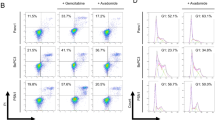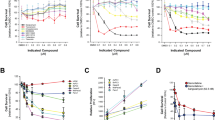Abstract
Application of several cell cycle checkpoint regulators seem to be promising in various experimental models including pancreatic cancer, and they are being evaluated in Phase I–II clinical trials. Among these compounds, mimosine, a plant-derived amino acid has shown an antineoplastic effect on human lung or pancreatic cancer xenografts in addition to cell cycle arrest in the late G1 phase. In the present study, immunosuppressed CBA mice bearing subcutaneously growing human ductal pancreatic adenocarcinomas were treated with 30 mg/kg L-mimosine for 34 days. The treatment resulted in retardation of tumor growth, accompanied by a significantly diminished proliferative activity (22.6% ± 1.7% Ki-67 positivity vs. 29.9% ±1.1% in controls, mean ± SEM, P < 0.007) and an increased apoptotic rate (14.5 ± 1.1 apoptotic cells/mm2 vs. 3.8 ± 0.4/mm2 in the controls, P < 0.0001). The immunohistochemical expression of the multidrug resistance gene (MDR1)-encoded P-glycoprotein (p170) was studied. The parental and the untreated tumors did not express p170 protein, but in the mimosine-treated samples 30 to 60% of the carcinoma cells displayed a linear, membranebound positivity. The results indicate that P-glyco-protein is inducible by a cell cycle regulator, creating an acquired resistant phenotype.
Similar content being viewed by others
References
Abe S, Kubota T, Otani Y, et al: UCN-01 (7-hydroxystaurosporine) inhibits in vivo growth of human cancer cells through selective perturbation of G1 phase checkpoint machinery. Jpn J Cancer Res 92: 537–545, 2001.
Abolhoda A, Wilson AE, Ross H, et al: Rapid activation of MDR1 gene expression in human metastatic sarcoma after in vivo exposure to doxorubicin. Clin Cancer Res 5: 3352–3356, 1999.
Bocsi J, Zalatnai A: Establishment and long term xenografting of human pancreatic carcinomas in immunosuppressed mice: Changes and stability in morphology, DNA ploidy and proliferative activity. J Cancer Res Clin Oncol 125: 9–19, 1999.
Buolamwini JK: Cell cycle molecular targets in novel anticancer drug discovery. Curr Pharm Des 6: 379–392, 2000.
Chang HC, Lee TH, Chuang LY, et al: Inhibitory effect of mimosine on proliferation of human lung cancer cells is mediated by multiple mechanisms. Cancer Lett 145: 1–8, 1999.
Chang HC, Weng CF, Yen MH, et al: Modulation of cell cycle regulatory protein expression and suppression of tumor growth by mimosine in nude mice. Int J Oncol 17: 659–665, 2000.
Chaudhary PM, Roninson IB: Induction of multidrug resistance in human cells by transient exposure to different chemotherapeutic drugs. J Natl Cancer Inst 85: 632–639, 1993.
Chung HC, Rha SY, Kim JH, et al: P-glycoprotein: the intermediate end point of drug response to induction chemotherapy in locally advanced breast cancer. Breast Cancer Res Treat 42: 65–72, 1997.
Fardel O, Lecureur V, Daval S, et al: Up-regulation of P-glycoprotein expression in rat liver cells by acute doxorubicin treatment. Eur J Biochem 246: 186–192, 1997.
Feldman ST, Schönthal A: Negative regulation of histone H1 kinase expression by mimosine, a plant amino acid. Cancer Res 54: 494–498, 1994.
Goldstein LJ, Galski H, Fojo A, et al: Expression of a multidrug resistance gene in human cancers. J Nati Cancer Inst 81: 116–124, 1989.
Granzotto M, Drigo I, Candussio L, et al: Rifampicin and verapamil induce the expression of P-glycoprotein in vivo in Ehrlich ascites tumor cells. Cancer Lett 205: 107–115, 2004.
Jimenez RE, Zalupski MM, Frank JJ, et al: Multidrug resistance phenotype in high grade soft tissue sarcoma: correlation of P-glycoprotein immunohistochemistry with pathologic response to chemotherapy. Cancer 86: 976–981, 1999.
Krude T: Mimosine arrests proliferating human cells before onset of DNA replication in a dose-dependent manner. Exp Cell Res 247: 148–159, 1999.
Lage H, Dietel M: Multiple mechanisms confer different drugresistant phenotypes in pancreatic carcinoma cells. J Cancer Res Clin Oncol 128: 349–357, 2002.
Leonard GD, Fojo T, Bates SE: The role of ABC transporters in clinical practice. Oncologist 8: 411–424, 2003.
Licht T, Fiebig HH, Brass KJ, et al: Induction of multiple-drug resistance during anti-neoplastic chemotherapy in vitro. Int J Cancer 49: 630–637, 1991.
Lu Z, Kleeff J, Shrikhande S, et al: Expression of the multidrugresistance 1 (MDR1) gene and prognosis in human pancreatic cancer. Pancreas 21: 240–247, 2000.
Mealey KL, Barhoumi R, Burghardt RC, et al: Doxycycline induces expression of P glycoprotein in MCF-7 breast carcinoma cells. Antimicrob Agents Chemother 46: 755–761, 2002.
Monden N, Abe S, Hishikawa Y, et al: The role of P-glycoprotein in human gastric cancer xenografts in response to chemotherapy. Int J Surg Invest 1: 3–10, 1999.
Nawrocki ST, Sweeney-Gotsch B, Takamori R, McConkey DJ: The proteasome inhibitor bortezomib enhances the activity of docetaxel in orthotopic human pancreatic tumor xenografts. Mol Cancer Ther 3: 59–70, 2004.
Ng IO, Lam KY, Ng M, et al: Expression of P-glycoprotein, a multidrug-resistance gene product, is induced by radiotherapy in patients with oral squamous cell carcinoma. Cancer 83: 851–857, 1998.
Nielsen D, Eriksen J, Maare C, et al. P-glycoprotein expression in Ehrlich ascites tumour cells after in vitro and in vivo selection with daunorubicin. Br J Cancer 78: 1175–1180, 1998.
Owa T, Yoshino II, Yoshimatsu K, Nagasu T: Cell cycle regulation in the G1 phase: a promising target for the development of new chemotherapeutic anticancer agents. Curr Med Chem 8: 1487–1503, 2001.
Ruiz van Haperen VW, Veerman G, Eriksson S, et al. Induction of resistance to 2′,2′-dilluorodeoxycytidine in the human ovarian cancer cell line A2780. Semin Oncol 22(Suppl 11): 35–41, 1995.
Sandor V, Bakke S, Robey RW, et al: Phase I trial of the histone deacetylase inhibitor, depsipeptide (FR901228, NSC 630176), in patients with refractory neoplasms. Clin Cancer Res 8: 718–728, 2002.
Sandor V, Robbins AR, Robey R, et al. FR901228 causes mitotic arrest but does not alter microtubule polymerization. Anticancer Drugs 11: 445–545, 2000.
Sato N, Ohta T, Kitagawa H, et al: FR901228, a novel histone deacetylase inhibitor, induces cell cycle arrest and subsequent apoptosis in refractory human pancreatic cancer cells. Int J Oncol 24: 679–685, 2004.
Schondorf T, Neumann R, Benz C, et al: Cisplatin, doxorubicin and paclitaxel induce mdr1 gene transcription in ovarian cancer cell lines. Recent Results Cancer Res 161: 111–116, 2003.
Sun D, Urrabaz R, Buzello C, Nguyen M: Induction of DNA ligase I by 1-beta-D-arabinosylcytosine and aphidicolin in Mia-PaCa human pancreatic cancer cells. Exp Cell Res 280: 90–96, 2002.
Suwa H, Ohshio G, Arao S, et al: Immunohistochemical localization of P-glycoprotein and expression of the multidrug resistance-1 gene in human pancreatic cancer: relevance to indicator of better prognosis. Jpn J Cancer Res 87: 641–649, 1996.
Thomas H, Coley HM: Overcoming multidrug resistance in cancer: an update on clinical strategy on inhibiting P-glycoprotein. Cancer Control 10: 159–165, 2003.
Tomida A, Naito M, Tsuruo T: Acute induction of adriamycin-resistance in human colon carcinoma HT-29 cells exposed to a sublethal dose of adriamycin. Jpn J Cancer Res 86: 224–232, 1995.
Tsvetkov LM, Russev GC, Anachkova BB: Effect of mimosine on DNA synthesis in mammalian cells. Cancer Res 57: 2252–2255, 1997.
Wada M, Hosotani R, Lee JU, et al: An exogenous cdk inhibitor, butyrolactone-I, induces apoptosis with increased Bax/Bcl2 ratio in p53-mutated pancreatic cancer cells. Anticancer Res 18: 2559–2566, 1998.
Wang G, Miskimins R, Miskimins WK: Mimosine arrests cells in G1 by enhancing the levels of p27(Kip1). Exp Cell Res 254: 64–71, 2000.
Wartenberg M, Fischer K, Hescheler J, Sauer H: Modulation of intrinsic P-glycoprotein expression in multicellular prostate tumor spheroids by cell cycle inhibitors. Biochim Biophys Acta 1589: 49–62, 2002.
Watson PA, Hanauske-Abel HH, Flint A, Lalande M: Mimosine reversibly arrests cell cycle progression at the G1-S phase border. Cytometry 12: 242–246, 1991.
Zalatnai A: Epidermal growth factor receptor, somatostatin and bcl-2 in human pancreatic tumor xenografts. An immunohistochemical study. Pathol Oncol Res 5: 146–151, 1999.
Zalatnai A: Potential role of cell cycle synchronizing agents in combination treatment modalities of malignant tumors. In vivo 19: 85–91, 2005.
Zalatnai A, Bocsi J: Mimosine, a plant-derived amino acid induces apoptosis in human pancreatic cancer xenografts. Anticancer Res 23: 4007–4010, 2003.
Author information
Authors and Affiliations
Corresponding author
Rights and permissions
About this article
Cite this article
Zalatnai, A. P-glycoprotein expression is induced in human pancreatic cancer xenografts during treatment with a cell cycle regulator, mimosine. Pathol. Oncol. Res. 11, 164–169 (2005). https://doi.org/10.1007/BF02893393
Received:
Accepted:
Issue Date:
DOI: https://doi.org/10.1007/BF02893393




